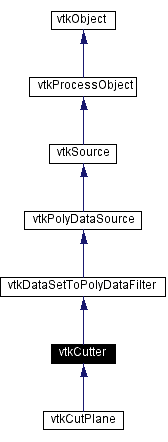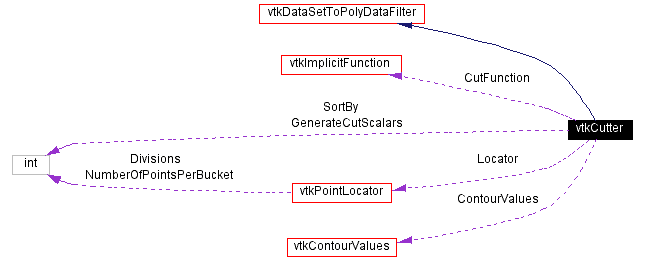
#include <vtkCutter.h>
Inheritance diagram for vtkCutter:


Public Methods | |
| virtual const char * | GetClassName () |
| virtual int | IsA (const char *type) |
| void | PrintSelf (ostream &os, vtkIndent indent) |
| unsigned long | GetMTime () |
| void | CreateDefaultLocator () |
| void | SetValue (int i, float value) |
| float | GetValue (int i) |
| float * | GetValues () |
| void | GetValues (float *contourValues) |
| void | SetNumberOfContours (int number) |
| int | GetNumberOfContours () |
| void | GenerateValues (int numContours, float range[2]) |
| void | GenerateValues (int numContours, float rangeStart, float rangeEnd) |
| virtual void | SetCutFunction (vtkImplicitFunction *) |
| virtual vtkImplicitFunction * | GetCutFunction () |
| virtual void | SetGenerateCutScalars (int) |
| virtual int | GetGenerateCutScalars () |
| virtual void | GenerateCutScalarsOn () |
| virtual void | GenerateCutScalarsOff () |
| void | SetLocator (vtkPointLocator *locator) |
| virtual vtkPointLocator * | GetLocator () |
| virtual void | SetSortBy (int) |
| virtual int | GetSortBy () |
| void | SetSortByToSortByValue () |
| void | SetSortByToSortByCell () |
| const char * | GetSortByAsString () |
Static Public Methods | |
| int | IsTypeOf (const char *type) |
| vtkCutter * | SafeDownCast (vtkObject *o) |
| vtkCutter * | New () |
Protected Methods | |
| vtkCutter (vtkImplicitFunction *cf=NULL) | |
| ~vtkCutter () | |
| void | Execute () |
Protected Attributes | |
| vtkImplicitFunction * | CutFunction |
| vtkPointLocator * | Locator |
| int | SortBy |
| vtkContourValues * | ContourValues |
| int | GenerateCutScalars |
vtkCutter is a filter to cut through data using any subclass of vtkImplicitFunction. That is, a polygonal surface is created corresponding to the implicit function F(x,y,z) = value(s), where you can specify one or more values used to cut with.
In VTK, cutting means reducing a cell of dimension N to a cut surface of dimension N-1. For example, a tetrahedron when cut by a plane (i.e., vtkPlane implicit function) will generate triangles. (Clipping takes a N dimensional cell and creates N dimension primitives.)
vtkCutter is generally used to "slice-through" a dataset, generating a surface that can be visualized. It is also possible to use vtkCutter to do a form of volume rendering. vtkCutter does this by generating multiple cut surfaces (usually planes) which are ordered (and rendered) from back-to-front. The surfaces are set translucent to give a volumetric rendering effect.
Definition at line 83 of file vtkCutter.h.
|
|
|
|
|
|
|
|
Return the class name as a string. This method is defined in all subclasses of vtkObject with the vtkTypeMacro found in vtkSetGet.h. Reimplemented from vtkDataSetToPolyDataFilter. Reimplemented in vtkCutPlane. |
|
|
Return 1 if this class type is the same type of (or a subclass of) the named class. Returns 0 otherwise. This method works in combination with vtkTypeMacro found in vtkSetGet.h. Reimplemented from vtkDataSetToPolyDataFilter. Reimplemented in vtkCutPlane. |
|
|
Return 1 if this class is the same type of (or a subclass of) the named class. Returns 0 otherwise. This method works in combination with vtkTypeMacro found in vtkSetGet.h. Reimplemented from vtkDataSetToPolyDataFilter. Reimplemented in vtkCutPlane. |
|
|
Will cast the supplied object to vtkObject* is this is a safe operation (i.e., a safe downcast); otherwise NULL is returned. This method is defined in all subclasses of vtkObject with the vtkTypeMacro found in vtkSetGet.h. Reimplemented from vtkDataSetToPolyDataFilter. Reimplemented in vtkCutPlane. |
|
||||||||||||
|
Methods invoked by print to print information about the object including superclasses. Typically not called by the user (use Print() instead) but used in the hierarchical print process to combine the output of several classes. Reimplemented from vtkSource. Reimplemented in vtkCutPlane. |
|
|
Construct with user-specified implicit function; initial value of 0.0; and generating cut scalars turned off. Reimplemented from vtkPolyDataSource. Reimplemented in vtkCutPlane. |
|
||||||||||||
|
Set a particular contour value at contour number i. The index i ranges between 0<=i<NumberOfContours. Definition at line 96 of file vtkCutter.h. |
|
|
Get the ith contour value. Definition at line 102 of file vtkCutter.h. |
|
|
Get a pointer to an array of contour values. There will be GetNumberOfContours() values in the list. Definition at line 109 of file vtkCutter.h. |
|
|
Fill a supplied list with contour values. There will be GetNumberOfContours() values in the list. Make sure you allocate enough memory to hold the list. Definition at line 117 of file vtkCutter.h. |
|
|
Set the number of contours to place into the list. You only really need to use this method to reduce list size. The method SetValue() will automatically increase list size as needed. Definition at line 125 of file vtkCutter.h. |
|
|
Get the number of contours in the list of contour values. Definition at line 131 of file vtkCutter.h. |
|
||||||||||||
|
Generate numContours equally spaced contour values between specified range. Contour values will include min/max range values. Definition at line 138 of file vtkCutter.h. |
|
||||||||||||||||
|
Generate numContours equally spaced contour values between specified range. Contour values will include min/max range values. Definition at line 145 of file vtkCutter.h. |
|
|
Override GetMTime because we delegate to vtkContourValues and refer to vtkImplicitFunction. Reimplemented from vtkObject. |
|
|
Specify the implicit function to perform the cutting. |
|
|
Specify the implicit function to perform the cutting. |
|
|
If this flag is enabled, then the output scalar values will be interpolated from the implicit function values, and not the input scalar data. |
|
|
If this flag is enabled, then the output scalar values will be interpolated from the implicit function values, and not the input scalar data. |
|
|
If this flag is enabled, then the output scalar values will be interpolated from the implicit function values, and not the input scalar data. |
|
|
If this flag is enabled, then the output scalar values will be interpolated from the implicit function values, and not the input scalar data. |
|
|
Specify a spatial locator for merging points. By default, an instance of vtkMergePoints is used. |
|
|
Specify a spatial locator for merging points. By default, an instance of vtkMergePoints is used. |
|
|
Set the sorting order for the generated polydata. There are two possibilities: Sort by value = 0 - This is the most efficient sort. For each cell, all contour values are processed. This is the default. Sort by cell = 1 - For each contour value, all cells are processed. This order should be used if the extracted polygons must be rendered in a back-to-front or front-to-back order. This is very problem dependent. For most applications, the default order is fine (and faster). |
|
|
Set the sorting order for the generated polydata. There are two possibilities: Sort by value = 0 - This is the most efficient sort. For each cell, all contour values are processed. This is the default. Sort by cell = 1 - For each contour value, all cells are processed. This order should be used if the extracted polygons must be rendered in a back-to-front or front-to-back order. This is very problem dependent. For most applications, the default order is fine (and faster). |
|
|
Set the sorting order for the generated polydata. There are two possibilities: Sort by value = 0 - This is the most efficient sort. For each cell, all contour values are processed. This is the default. Sort by cell = 1 - For each contour value, all cells are processed. This order should be used if the extracted polygons must be rendered in a back-to-front or front-to-back order. This is very problem dependent. For most applications, the default order is fine (and faster). Definition at line 186 of file vtkCutter.h. |
|
|
Set the sorting order for the generated polydata. There are two possibilities: Sort by value = 0 - This is the most efficient sort. For each cell, all contour values are processed. This is the default. Sort by cell = 1 - For each contour value, all cells are processed. This order should be used if the extracted polygons must be rendered in a back-to-front or front-to-back order. This is very problem dependent. For most applications, the default order is fine (and faster). Definition at line 188 of file vtkCutter.h. |
|
|
Return the sorting procedure as a descriptive character string. Definition at line 214 of file vtkCutter.h. |
|
|
Create default locator. Used to create one when none is specified. The locator is used to merge coincident points. |
|
|
This method is the old style execute method Reimplemented from vtkSource. Reimplemented in vtkCutPlane. |
|
|
Definition at line 202 of file vtkCutter.h. |
|
|
Definition at line 204 of file vtkCutter.h. |
|
|
Definition at line 205 of file vtkCutter.h. |
|
|
Definition at line 206 of file vtkCutter.h. |
|
|
Definition at line 207 of file vtkCutter.h. |
 1.2.11.1 written by Dimitri van Heesch,
© 1997-2001
1.2.11.1 written by Dimitri van Heesch,
© 1997-2001